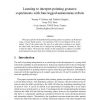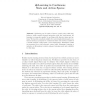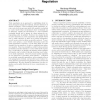1166 search results - page 47 / 234 » Negotiating Using Rewards |
161
click to vote
MIRRORBOT
2005
Springer
15 years 7 months ago
2005
Springer
This paper explores the hypothesis that pointing gesture recognition can be learned using a reward based system. An experiment with two four-legged robots is presented. One of the...
110
Voted
AUSAI
1999
Springer
15 years 6 months ago
1999
Springer
Abstract. Q-learning can be used to learn a control policy that maximises a scalar reward through interaction with the environment. Qlearning is commonly applied to problems with d...
124
Voted
NECO
2010
15 years 18 days ago
2010
Most conventional Policy Gradient Reinforcement Learning (PGRL) algorithms neglect (or do not explicitly make use of) a term in the average reward gradient with respect to the pol...
142
click to vote
WPES
2003
ACM
15 years 7 months ago
2003
ACM
Trust negotiation is an approach to establishing trust between strangers through the bilateral, iterative disclosure of digital credentials. Under automated trust negotiation, acc...
139
Voted
AAAI
2007
15 years 4 months ago
2007
In designing Markov Decision Processes (MDP), one must define the world, its dynamics, a set of actions, and a reward function. MDPs are often applied in situations where there i...



